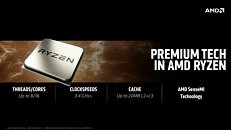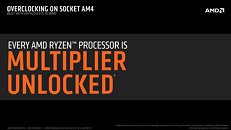Raevenlord
News Editor
- Joined
- Aug 12, 2016
- Messages
- 3,755 (1.18/day)
- Location
- Portugal
| System Name | The Ryzening |
|---|---|
| Processor | AMD Ryzen 9 5900X |
| Motherboard | MSI X570 MAG TOMAHAWK |
| Cooling | Lian Li Galahad 360mm AIO |
| Memory | 32 GB G.Skill Trident Z F4-3733 (4x 8 GB) |
| Video Card(s) | Gigabyte RTX 3070 Ti |
| Storage | Boot: Transcend MTE220S 2TB, Kintson A2000 1TB, Seagate Firewolf Pro 14 TB |
| Display(s) | Acer Nitro VG270UP (1440p 144 Hz IPS) |
| Case | Lian Li O11DX Dynamic White |
| Audio Device(s) | iFi Audio Zen DAC |
| Power Supply | Seasonic Focus+ 750 W |
| Mouse | Cooler Master Masterkeys Lite L |
| Keyboard | Cooler Master Masterkeys Lite L |
| Software | Windows 10 x64 |
With AMD's Ryzen chips launch being ever closer to us, details about its product line - which still remain mysterious enough - eventually begin to slip. Reportedly, AMD's entry-level Ryzen chips - the SR3 line of processors, if previous leaks ring true, will be made up of 4-core processors with AMD's SMT (Simultaneous Multi-Threading), the equivalent to Intel's HT (Hyper-Threading) disabled. These will be, apparently, true 4-core processors, without any additional logical processors exposed by SMT.




If reports about AMD's line-up being composed of 8-core and 6-core processors, then with this news, we can now theoretically paint the numbers on AMD's Ryzen line-up. As it stands with this new information, it could be composed of entry-level four-core parts (under the SR3 product stack, and a base clock of 3.4 GHz at the minimum for any Ryzen-based part, according to AMD); a midrange six-core, twelve-thread part (under the SR5 moniker; I don't figure AMD would disable their much-lauded SMT on this six-core part); and the top-of-the-line, SR7 8-core, 16-thread chip we've seen in so many benchmarks and leaks.
I find it strange that AMD would cut the SMT out of any of its processor lines, though - at least, from all of its processors. My educated guess would be that AMD is planning to release a special-edition part (or a specific part number) just like Intel does in its i3, i5 and i7 product lines to differentiate between multiplier-locked (non-K processors) and multiplier-unlocked (K processors, such as the i5-7600K). Though, with all AMD Ryzen processors having an unlocked multiplier, like the company has often announced, this differentiation might be between SMT-disabled and SMT-enabled chips - perhaps with AMD bringing back their Black Edition line of processors for this particular use-case. It just seems strange for AMD to shed one of their vaunted technologies (which would allow them to improve their performance at little to no cost added) completely, considering the comeback the company is planning to accomplish.
View at TechPowerUp Main Site




If reports about AMD's line-up being composed of 8-core and 6-core processors, then with this news, we can now theoretically paint the numbers on AMD's Ryzen line-up. As it stands with this new information, it could be composed of entry-level four-core parts (under the SR3 product stack, and a base clock of 3.4 GHz at the minimum for any Ryzen-based part, according to AMD); a midrange six-core, twelve-thread part (under the SR5 moniker; I don't figure AMD would disable their much-lauded SMT on this six-core part); and the top-of-the-line, SR7 8-core, 16-thread chip we've seen in so many benchmarks and leaks.
I find it strange that AMD would cut the SMT out of any of its processor lines, though - at least, from all of its processors. My educated guess would be that AMD is planning to release a special-edition part (or a specific part number) just like Intel does in its i3, i5 and i7 product lines to differentiate between multiplier-locked (non-K processors) and multiplier-unlocked (K processors, such as the i5-7600K). Though, with all AMD Ryzen processors having an unlocked multiplier, like the company has often announced, this differentiation might be between SMT-disabled and SMT-enabled chips - perhaps with AMD bringing back their Black Edition line of processors for this particular use-case. It just seems strange for AMD to shed one of their vaunted technologies (which would allow them to improve their performance at little to no cost added) completely, considering the comeback the company is planning to accomplish.
View at TechPowerUp Main Site







